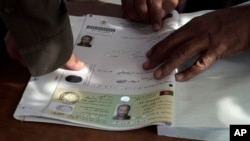In the streets of Marco, Afghanistan, men carry stacks of voter cards, looking for buyers.
Karim Agha said business is so good that sometimes he has large orders.
“Sometimes people come here and ask for 500 or 1000 voters' registration cards to buy,” Agha said while holding a couple of them.
He said he could buy voter cards for 200 Pakistani rupees ($1.89 USD) each from villagers and sell them for between 500 to 1,000 rupees ($4.73 - $9.50 USD).
“I've already sold voter cards to people in rate of 500 to 1000 [Pakistani rupees], sometimes my friends come to me and ask for voter cards,” Agha added.
Traders like Agha say they are not engaging in criminal behavior, but merely responding to the demands of rich politicians and poor villagers who choose to trade their votes for a few extra meals.
There are months to go until polling day on April 5, but many presidential candidates are already alarmed by the scale of the illicit trade in voter cards and questioning how legitimate the election will be.
“We urge the government and electoral commission to control and avoid fraud in the elections because in the past election we witnessed that people even sold their cards for up to 1000 rupees,” said Rahmat Khan, a resident of Marco, a village in Nangarhar province.
An election marred by more fraud than the last polls in 2009 will play into the hands of Taliban insurgents and risks a breakdown of government as multinational troops pull out of the war-ravaged nation.
“When people buy and sell voter registration cards for the cost of lunch in the price range of 5 to 10 dollars it means that Afghan democracy is on sale and not dependent on people's votes. These issues have to be controlled. Any candidate who buy voter's card in fact he deceives his nation and people. He is responsible,” said Azizullah Ludin, who was the chairman of the Afghan election watchdog in 2009 and is now himself running for president.
The United States, which has led an international effort to restore democracy in Afghanistan since it helped oust the hardline Islamic Taliban regime in 2001, desperately wants the election to be the crowning moment of its presence before Western combat troops withdraw at the end of 2014.
The winning candidate will replace President Hamid Karzai, who is constitutionally barred from seeking a third five-year term. Among the candidates are his elder brother Qayum, former foreign minister Zalmay Rassoul, another former foreign minister Abdullah Abdullah and a former Islamist warlord turned parliamentarian, Abdul Rab Rassoul Sayyaf.
Some of the candidates and their supporters were on opposite sides of the Afghan civil war in the 1990s and charges of fraud in the election could set off fresh tensions, strengthening the Taliban.
The nomination process for the 2014 poll ended only days ago.
The Independent Election Commission, which was created to ensure elections are free and fair, has had little to say on the matter of voter card trading so far.
Karim Agha said business is so good that sometimes he has large orders.
“Sometimes people come here and ask for 500 or 1000 voters' registration cards to buy,” Agha said while holding a couple of them.
He said he could buy voter cards for 200 Pakistani rupees ($1.89 USD) each from villagers and sell them for between 500 to 1,000 rupees ($4.73 - $9.50 USD).
“I've already sold voter cards to people in rate of 500 to 1000 [Pakistani rupees], sometimes my friends come to me and ask for voter cards,” Agha added.
Traders like Agha say they are not engaging in criminal behavior, but merely responding to the demands of rich politicians and poor villagers who choose to trade their votes for a few extra meals.
There are months to go until polling day on April 5, but many presidential candidates are already alarmed by the scale of the illicit trade in voter cards and questioning how legitimate the election will be.
“We urge the government and electoral commission to control and avoid fraud in the elections because in the past election we witnessed that people even sold their cards for up to 1000 rupees,” said Rahmat Khan, a resident of Marco, a village in Nangarhar province.
An election marred by more fraud than the last polls in 2009 will play into the hands of Taliban insurgents and risks a breakdown of government as multinational troops pull out of the war-ravaged nation.
“When people buy and sell voter registration cards for the cost of lunch in the price range of 5 to 10 dollars it means that Afghan democracy is on sale and not dependent on people's votes. These issues have to be controlled. Any candidate who buy voter's card in fact he deceives his nation and people. He is responsible,” said Azizullah Ludin, who was the chairman of the Afghan election watchdog in 2009 and is now himself running for president.
The United States, which has led an international effort to restore democracy in Afghanistan since it helped oust the hardline Islamic Taliban regime in 2001, desperately wants the election to be the crowning moment of its presence before Western combat troops withdraw at the end of 2014.
The winning candidate will replace President Hamid Karzai, who is constitutionally barred from seeking a third five-year term. Among the candidates are his elder brother Qayum, former foreign minister Zalmay Rassoul, another former foreign minister Abdullah Abdullah and a former Islamist warlord turned parliamentarian, Abdul Rab Rassoul Sayyaf.
Some of the candidates and their supporters were on opposite sides of the Afghan civil war in the 1990s and charges of fraud in the election could set off fresh tensions, strengthening the Taliban.
The nomination process for the 2014 poll ended only days ago.
The Independent Election Commission, which was created to ensure elections are free and fair, has had little to say on the matter of voter card trading so far.





